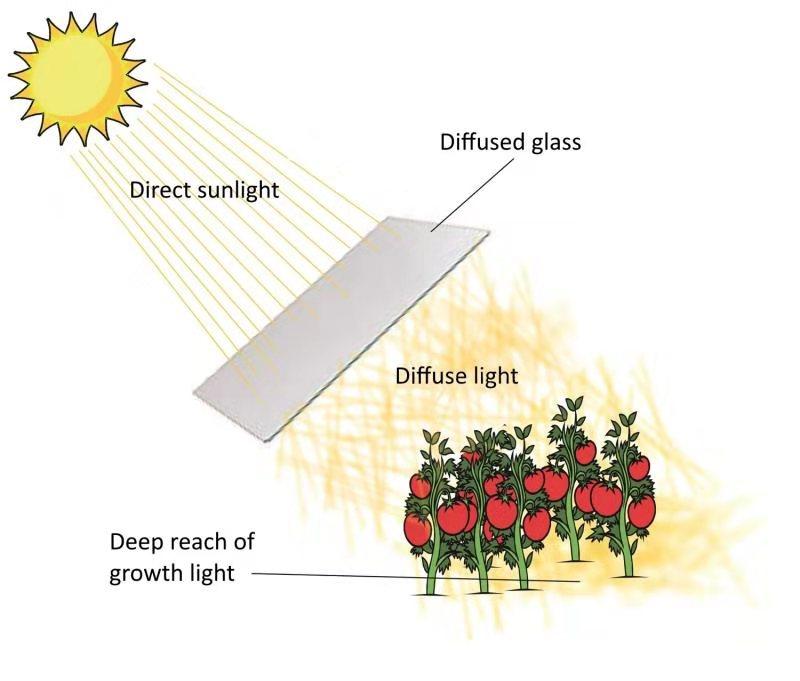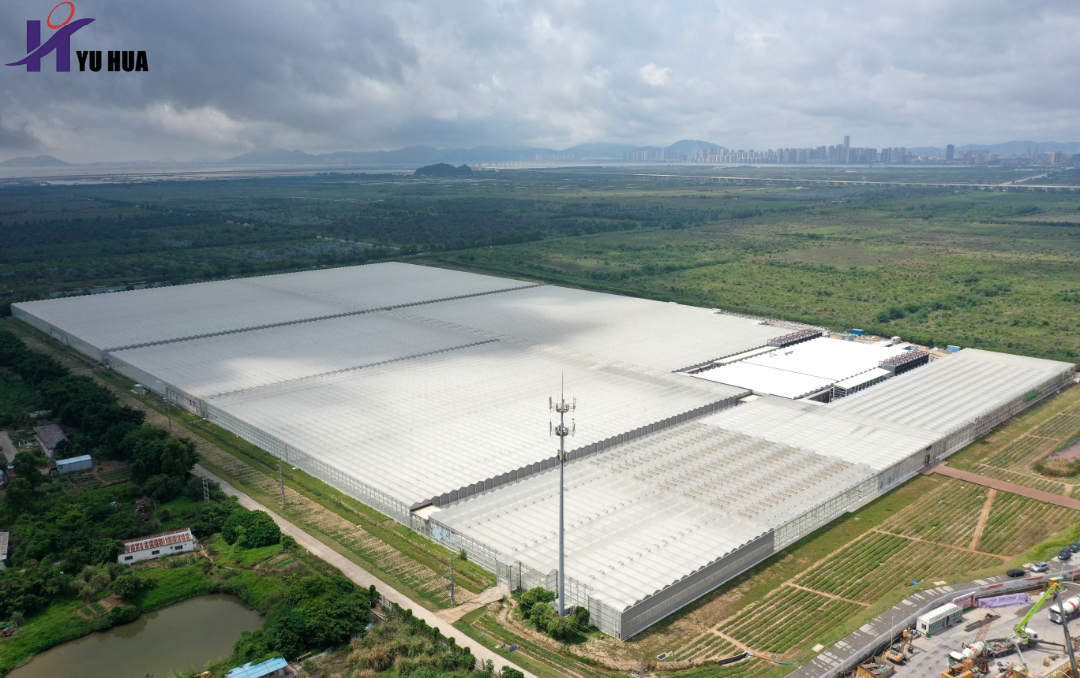
What is the difference between diffused glass and a diffuse coating?
Diffused glass and diffuse coatings are both ways of creating diffused light in greenhouse farming. And diffused light has a positive effect on many crops, such as a better light distribution, better light range, less stress for the crop and a lower temperature in the crop. The difference between diffuse glass and diffuse coatings is that with diffuse coatings, agents are applied to the greenhouse to create diffuse light. Diffuse glass is glass that has been made diffuse. Both have advantages and disadvantages and affect the price, flexibility and durability.
What is diffuse light?
Diffuse light is light which is scattered from and to all directions, to make sure no harsh shadows are there. This has a positive influence on the crop. Especially large/ tall crops with large leaves profit from diffuse light, because the vertical diffusion of light is strongly improved. Like this, the leaves at the bottom of the crop also receive direct light. When these leaves get more light, more photosynthesis is done leading to growth of the crop. Besides, many crops have a better ability to make use of diffuse light than normal light.The effect of both diffused glass and diffuse coating is the exact same: they create diffuse light in the greenhouse with a low to a high degree of diffusion. The differences between diffused glass and a diffuse coating influence the price, flexibility and permanence. The image below shows you how diffuse light looks like.

Diffused glass greenhouse
Greenhouses with diffused glass have been a trend for the last couple of years, especially in the cultivation of vegetables. Many growers that build a new greenhouse, decide to incorporate diffused glass. Glass can be made diffuse in two ways: chemical etching or by structure rolling.
AR-coating
An important thing to know about light diffusion is that it is always at the expense of a small percentage light transmission. This does not have to be a problem to all crops, but for many vegetables (especially tomato) this is undesired. Generally, these crops make use of all of the light that is available. Losing light is very likely to have a negative effect on the production, particularly when it is not compensated (e.g. with CO2). In order to compensate the loss in light transmission, both diffuse as standard float glass (single or double) can be provided with a light reflecting coating. This coating leads to a small increase of light transmission on both sides.
The AR-coating of glass is fragile and irreversible damage to the glass can be done by incorrect manners of cleaning or maintenance. If this happens, percentages of light transmission are lost.
Products containing fluoride are known for causing damage to AR-coated glass, but so do other agressive cleaners. However, there is a lack of knowledge in terms of the effects of certain cleaners on AR coatings. The effects vary from product to the surface on which it is used to the technique of application.
A distinction is made between glass on which the AR-coating is applied with sol-gel or applied through etching of the glass. Cleaning diffused glass with or without AR-coating can be challenging compared to cleaning standard float glass.
Costs of diffused glass versus diffused coating
The purchase of diffused glass is generally seen as an investment for several years, or even for the greenhouse's entire life time. Diffused glass (with or without AR-coating) is more expensive than standard float glass.
A diffuse coating costs just one fraction of the costs of new diffused glass.
Flexibility
With diffused glass, the exact same degree of light diffusion is (continuously) ensured throughout the years. This makes it harder to switch to another variety or to an entirely different crop, since all different varieties and crops have other needs in terms of light and temperature.
An additional need for protection can also occur, as a result of a higher degree of light diffusion, or that even part of the light should be shielded away with a chalk.
A higher level of diffusion, caused by the AR-coated glass can also lead to problems for the new crop. For example the fruits grow higher within the crop or are less resistant to radiance. Besides, the new variety might need more light than the previous cultivation, which could mean the decrease in light is unfavorable. The combination of standard float glass and shading agents (both chalk shading agents and diffuse coatings) can be selected to meet a grower's needs at any time.
Is diffused glass beneficial?
As a grower, you should always question if your crop would benefit from diffused glass. If a crop needs protection of a shading agent during spring and summer, or if the shading screen is closed during these seasons, diffused glass would only be helpful in autumn and winter. In some countries, there isn't much light to spread during these autumn and winter months. Also, during this time of the year most of the light is already diffuse, because of the clouds.
Ask yourself: is it worth the costs?
Diffuse coating in the agricultural sector
Also diffuse coatings ensure the even diffusion of light. The coatings are flexible in use and can be applied to any greenhouse without diffused glass. New coatings can be bought every year, while diffused glass is an investment for many years. For coatings, the measured transmission is a little lower (88%) than that of diffused glass (91%), but for most cultivations this would even be an advantage.
Continuous innovations in diffuse coatings and diffused glass for greenhouse farming
Developments in diffuse coatings and diffused glass are continuous, and are rapidly followed by each other. Standard float glass allows the grower to profit from the newest development in diffuse coatings each year. The investment in new glass often is seen as a long-term investment. This means you can be ''stuck'' to old, outdated technology for several years, even when new technology is developed.
Even if it is just a subset of all the advantages, if you realize that a glass greenhouse does have absolute advantages. The light transmittance of Yuhua greenhouse glass can be as high as 99%, and there are 8 haze options including 5/10/20/30/40/50/70/75. Yuhua® also supplies glass to greenhouse project companies such as Havecon, Kubo and Van Der Hoeven. For more information, please contact us at overseas@hnyxlc.com.

Tags:anti-reflective glass diffuse glass agricultural greenhouses glass greenhouse venlo greenhouse AR glass greenhouses glass agricultural glass horticultural glass #greenhouseglass #Antireflectiveglass #Diffusetemperedglass #Ultrawhitefloatglass #agriculturalgreenhouseglass #diffuseglass #horticulturalglass #Tomatogreenhouse #Coloredpeppergreenhouse #Lettucegreenhouse #Agriculturalgreenhouse #ARglass #venlogreenhouse #greenhouseglass #Antireflectiveglass #Diffusetemperedglass #Ultrawhitefloatglass #agriculturalgreenhouseglass #diffuseglass #horticulturalglass #Tomatogreenhouse #Coloredpeppergreenhouse #Lettucegreenhouse #Agriculturalgreenhouse #ARglass #venlogreenhouse #GlassManufacturer #invernadero #ArchitecturalGlass #ClearFloatGlass #FloatGlass
Previous:The biggest difference between glass and plastic for greenhouses is not the price, but the productio
Next:The difference between Yuhua tempered glass and ordinary glass



















